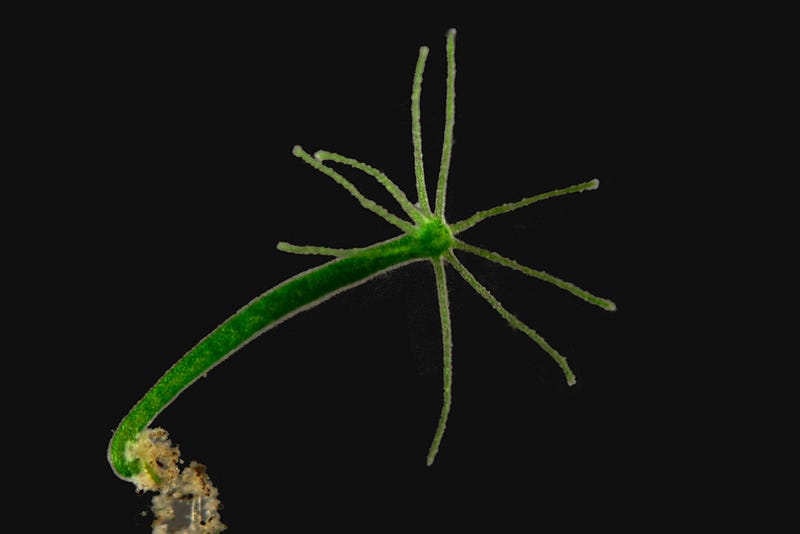# Unveiling the Ancient Roots of Sleep: Insights from Hydra
Written on
Chapter 1: The Enigmatic Hydra
What insights can we gain about sleep from microscopic organisms named after a creature from Greek mythology?

In Greek lore, the hydra is an immortal serpent with numerous heads, famously known for its ability to regenerate. The real-world Hydra vulgaris shares intriguing similarities with this mythological figure. This microscopic creature was first observed by Antonie van Leeuwenhoek in the early 1700s, and later in 1744, Abraham Tremblay documented its remarkable capacity for regeneration, akin to the mythical hydra's ability to regrow heads.
Hydra vulgaris is a favored subject in scientific studies due to its fascinating characteristics and manageable size of about 10mm. Its rudimentary nervous system offers researchers a unique window into evolutionary biology.
In a collaborative study conducted by scientists in South Korea and Japan, researchers set out to determine whether Hydra could experience sleep. While larger species such as various insects do exhibit sleep patterns, the question remained: could an organism with such a basic nervous system also engage in sleep?
To their surprise, the findings indicated that Hydra vulgaris does indeed enter a state comparable to sleep. Their research, published in Science Advances in October 2020, provides intriguing evidence regarding sleep in simple organisms.
Section 1.1: Observing Sleep Patterns
The researchers began by filming the Hydra to monitor their daily activity. They implemented a 12-hour light/dark cycle to analyze their sleep behaviors. The Hydra displayed an inactive state similar to how humans might doze off at night.
When exposed to light, the Hydra would be roused from their slumber, demonstrating slower responses to stimuli such as food. Notably, these creatures exhibited longer periods of sleep during the night compared to daylight hours, with sleep episodes averaging around 20 minutes. Interestingly, Hydra also seemed to fall into sleep more quickly after periods of deprivation.
Would the neurotransmitters that facilitate human sleep also play a role in Hydra? Key sleep-related neurotransmitters such as melatonin, GABA, and dopamine were found to enhance both the duration and frequency of sleep cycles in Hydra.
Curiously, while dopamine generally promotes wakefulness in other species, this study suggests that its impact may vary depending on the complexity of the nervous system. This indicates that fundamental signaling pathways related to sleep are conserved even in simpler invertebrates.
Subsection 1.1.1: The Purpose of Sleep
As we consider the existence of sleep in even the simplest creatures like the Hydra, it raises questions about the necessity of a brain for sleep. Can a basic nervous system sufficiently induce sleep, or might sleep have developed before the advent of nervous systems?
Sleep plays a pivotal role in numerous biological functions, including memory consolidation, emotional regulation, and the clearance of waste from the brain. Interestingly, signals from muscles alone can trigger sleep, as seen in studies involving flies where immune-related genes are linked to sleep regulation.
Furthermore, sleep is essential for physical health, influencing athletic performance and muscle recovery. When we are unwell, our immune systems initiate sleep to support healing. There is substantial evidence highlighting the advantages of sleep for overall health, even in organisms without sophisticated nervous systems.
This suggests that sleep may serve a fundamental role that extends beyond the brain. Despite its simplistic nervous system, Hydra still engages in sleep, indicating that sleep could have evolved as a mechanism for recovery from physical exertion or illness. Future research may uncover that sleep's origins predate the development of nervous systems altogether.
Chapter 2: Insights from Modern Research
In this video, Dr. Matt Walker delves into the science of dreams, nightmares, and lucid dreaming, shedding light on the intricate mechanisms of sleep.
This episode of "The Day Tomorrow Began" explores the mysteries of sleep, offering a deeper understanding of its evolution and significance across species.